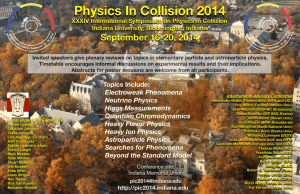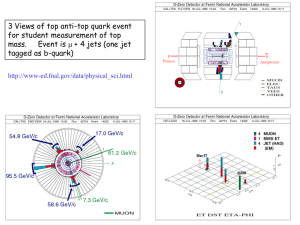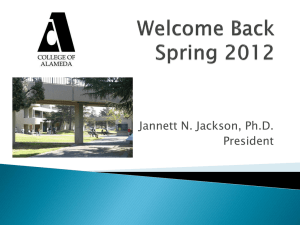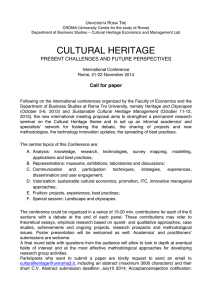J-PARCにおけるチャーム原子核生成
advertisement
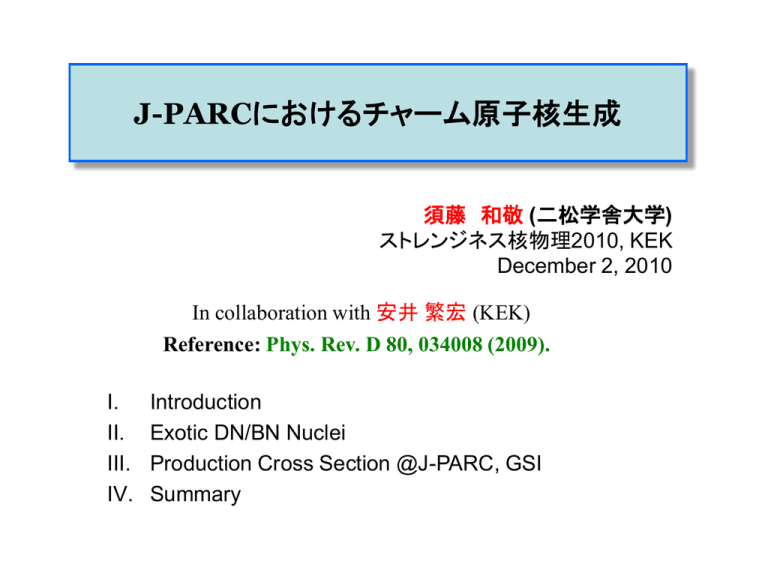
J-PARCにおけるチャーム原子核生成 須藤 和敬 (二松学舎大学) ストレンジネス核物理2010, KEK December 2, 2010 In collaboration with 安井 繁宏 (KEK) Reference: Phys. Rev. D 80, 034008 (2009). I. II. III. IV. Introduction Exotic DN/BN Nuclei Production Cross Section @J-PARC, GSI Summary Introduction • Exotic nuclei: – 原子核とstrange, charm, bottomなどを含むハドロンとの束縛状態 – Λ(1405)-KbarNの束縛状態? Hyper nuclei, Kaonic nuclei, … • Why charm/bottom? – 新しいエネルギースケール(mc, mb)の導入 ≫ΛQCD – 新しい対称性(heavy quark symmetry) – QCDに基づいた有効理論(HQET, NRQCD, pNRQCD, …) これまでのストレンジネスの物理とは本質的に異なる可能性がある Mass scale of quarks 35 150 200 1500 4700 ud s ΛQCD c b Chiral Symmetry SU(3)L x SU(3)R Mass [MeV] Heavy Quark (Spin & Flavor) Symmetry SU(2)spin x SU(Nh)flavor charm/bottomを含むメソン(D/B)と核子との相互作用を求め、 これらが束縛状態を形成するか否かを調べる。 K. Sudoh (Nishogakusha Univ.) Page-2 Multi-Favored Nuclear Chart Charm Charmed Nuclei Bottom Bottom Nuclei K. Sudoh (Nishogakusha Univ.) Page-3 What are Charm/Bottom Nuclei? Charm/Bottom Mesons D, D*, B, B*, … This is our subject in this talk! neutron proton K. Sudoh (Nishogakusha Univ.) Nucleus Page-4 DN/BN Potential Q. What is the interaction between D/B and N ? D/B ?? N K. Sudoh (Nishogakusha Univ.) Page-5 Conventional Approach • これまでの解析は主にSU(N)フレーバー対称性を用いた解析 – Hoffmann-Lutz (2005), Mizutani-Ramos (2006), … – カイラル対称性を尊重したコンタクト相互作用(Weinberg-Tomozawa) Strangeness Charm Bottom K N D N B N K N D N B N SU(3) SU(4) SU(5) – D, Bメソンをπ, Kメソンと同様にNGボソンとして取り扱えるか? – カイラルダイナミクスはさほど重要ではない → Heavy quark dynamics K. Sudoh (Nishogakusha Univ.) Page-6 Heavy Quark Symmetry • Charm/Bottomの物理においてはHeavy Quark Symmetryが重要 – PseudoscalarとVectorが縮退 K* 400 MeV K* is almost irrelevant in dynamics. D*/B* are new fundamental d.o.f. D* 140 MeV B* 45 MeV K D B 500 MeV 1870 MeV 5280 MeV Chiral dynamics K. Sudoh (Nishogakusha Univ.) Heavy quark dynamics Page-7 DN/BN Interaction • One pion exchange interaction – KN相互作用では pKK couplingが存在しない。(短距離相互作用のみ) – DN/BNの場合はD*/B*を通じてのpion exchangeが存在 K N p, w, r K D(*) N p, w, r N pion exchange is absent. (short range force) Weinberg-Tomozawa K. Sudoh (Nishogakusha Univ.) D(*) B(*) N p, w, r N B(*) N pion exchange is present. (long range force) Heavy Meson Effective Theory Page-8 DN/BN Potential • PN-P*N and P*N-P*N potentials – Based on heavy quark (meson) effective theory P(*) G. Burdman and J.F. Donoghue (1992) M.B. Wise (1992) T.-M. Yan, H.-Y. Cheng, C.-Y. Cheung, G.-L. Lin, Y.C. Lin and H.-L. Yu (1997) N with p vector P(*) N P=D or B OPEP K. Sudoh (Nishogakusha Univ.) pseudoscalar S. Yasui and K. S., PRD80, 034008 (2009) Page-9 DN/BN Potential • PN-P*N and P*N-P*N potentials – OPEP + short range repulsion (w, r) → Approximation by a contact interaction P(*) N c w cr 1 2 3 (r ) cI 0,1 3 (r ) p, w, r P(*) N Bonn A Bonn B cI=0 [fm2] 2.77 1.62 cI=1 [fm2] 7.79 8.68 cf. smaller than NN contact interaction cNNI=0 = 17.8 [fm2] for A, 18.1 [fm2] for B K. Sudoh (Nishogakusha Univ.) Page-10 DN/BN Bound States Q. Are there bound states of D/B and N ? D/B N ?? D(cq)-N(qqq) B(bq)-N(qqq) * No annihilation process K. Sudoh (Nishogakusha Univ.) Page-11 Classification of State • Classification of states S. Yasui and K. S., PRD80, 034008 (2009) |state> = |PN>+ |P*N> P=Dbar (cbarq), B (bbarq) * No annihilation process Case 1. JP=1/2- (I=0 or 1) |PN; 2S1/2 > + |P*N; 2S1/2 > + |P*N; 4D1/2 > 0 1/2 s-wave P 1 + N 1 1/2 s-wave P* + N 1/2 d-wave P* N This plays an important role. K. Sudoh (Nishogakusha Univ.) Page-12 Numerical Results • JP=1/2-, I=0: |PN; 2S1/2 > + |P*N; 2S1/2 > + |P*N; 4D1/2 > wave functions [fm-3/2] OPEP + contact interaction |PN; 2S1/2 > |P*N; 2S1/2 > DN p B.E. [MeV] radius [fm] 10.8 1.7 +cont.A +cont.B 6.6 2.1 8.2 1.9 strong mixing by tensor coupling |P*N; 4D1/2 > K. Sudoh (Nishogakusha Univ.) Page-13 Production Cross Section • Factorization theorem: cross section can be factorized in pQCD – Inclusive hadron production: pp h X fa ( xa , Q2 ) fb ( xb , Q2 ) ˆ (ab cX ) Dch ( z, Q2 ) a ,b,c PDFs and FFs: Determined using experimental data K. Sudoh (Nishogakusha Univ.) Amplitude: Calculable in pQCD Page-14 Charm Production @J-PARC • Subprocesses for D/D production – O(as2) 2→2 tree-level channels in LO qq cc NLO → K factor x LO gg cc well-calculated in perturbation theory in αs J-PARC → pp gg dominance GSI → pp qq dominance K. Sudoh (Nishogakusha Univ.) Page-15 Numerical Results: • • D Cross section of D production: ( pp, pp DX ) Total cross section at the energies of J-PARC and GSI-FAIR. D J-PARC D ( pp, Ebeam 30 GeV) 0.23 103 [nb] √s=8 GeV N = 15.5x106 /week D ( pp, Ebeam 50 GeV) 0.98 103 [nb] √s=10 GeV N = 66.0x106 /week GSI PANDA, PAX D p PANDA ( pp, Ebeam 15GeV) 0.42 103 [nb] √s=5.5 GeV N = 0.50x106 /week D p p PAX ( pp, Ebeam 15GeV, Ebeam 3.5GeV) 7.03 103 [nb] N = 8.33x106 /week √s=14.5 GeV Yield: N=σ・L・Br・ε LJ-PARC = 3.6 x 106 nb-1/week Br(D-→K+π-π-) = 0.094 from PDG09 LGSI = 6.3 x 104 nb-1/week ε 〜 0.2 K. Sudoh (Nishogakusha Univ.) Page-16 Numerical Results: • DN cross section is estimated as follows. • DN DN ( pp DX ) M 3 D DN (0) 2 Total cross section at the energies of J-PARC and GSI-FAIR. J-PARC π + contact B DN ( pp, Ebeam 30 GeV) 0.35 [nb] N = 23.7x103 /week DN ( pp, Ebeam 50 GeV) 1.48 [nb] N = 100.0 x103 /week GSI PANDA, PAX DN p PANDA ( pp, Ebeam 15GeV) 0.63 [nb] N = 0.75x103 /week DN p p PAX ( pp, Ebeam 15GeV, Ebeam 3.5GeV) 10.62 [nb] N = 12.58x103 /week K. Sudoh (Nishogakusha Univ.) Page-17 Summary • DN bound states are discussed with respecting to the heavy quark symmetry. – OPEP + contact repulsive interaction JP=1/2-,I=0 set A set B – JP=1/2- with I=0のチャネルのみ束縛解 が存在 (cf. L(1405)) B.E. [MeV] radius [fm] 6.6 2.1 8.2 1.9 • Charmed nuclei will be studied in experiments (J-PARC, GSI, …) – 摂動計算によりDNの生成断面積を見積もった。 – 強い相互作用による崩壊は存在しない。 – 弱崩壊が支配的(e.g. D–p → Kp–p–p) →狭い崩壊幅 • Lots more coming!! K. Sudoh (Nishogakusha Univ.) Page-18

